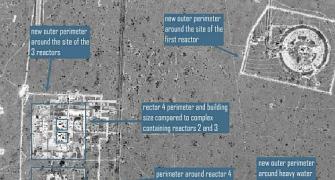General John Allen, United States commander of the International Support Assistance Force in Afghanistan has acknowledged that the level of mistrust with Pakistan is a major challenge that has yet to be overcome but that the resurrection of this military relationship is underway.
Allen said, "Pakistan isn't going anywhere. Pakistan is always going to be a 1,500-mile border along Afghanistan. And trust has been a problem. And so in order to overcome many of these issues, we're going to have to build trust again."
He said, "In the investigation that was done in the aftermath of the 25-26 November cross-border incident, one of the findings was that -- was an absence of trust created a sequence of events that ultimately resulted in the death of 24 Pakistani troops. Sooner or later there is a certain amount of risk that needs to be taken in a relationship in order to build trust, and we're going to have to do that."
Allen reiterated, "Pakistan is not going anywhere, Afghanistan is not going anywhere. And the region will best be served in terms of long-term stability and security if we can build the kind of trust necessary between all the parties in that region."
Asked if it wouldn't be better to cultivate India in terms of a reliable ally in bringing peace and stability to Afghanistan and by extension to the region, Allen said, "We are not talking -- I am not talking to India, so I'll just be very clear there. I have no involvement with India at all."
When informed that the majority of polls in Pakistan indicate a massive anti-American fervor and a mistrust of the US by the Pakistani populace and how this can be overcome, Allen brusquely retorted, "That would seem to be a question that should be asked of Islamabad, not of the commander of International Security Assistance Force."
Earlier, asked is the US-Pakistan military relationship was deteriorating and the growing clamor in the US Congress to cut off aid to Pakistan, and how all this would impact any progress in the Afghan war because without Pakistan's assistance, the entire phased withdrawal of US forces and the handover to the Afghan army could be jeopardised,
Allen said, "I don't see that it is a deterioration. I think the fact that we're talking about reopening the ground line of communications is a very positive step in that regard."
"Now it's -- it is a negotiation, and negotiations take time, so I can't predict what the outcome will be and how soon that will be. But I have recently led a team to Islamabad to renew our conversation with the Pakistani military in the context of the Tripartite Commission, first time in a year. It was a very positive conversation about taking steps and measures necessary to prevent a recurrence of the events of 25 and 26 November."
Allen said, "It's important to understand that Pakistan has many of its own challenges on the eastern side of that international frontier. It is engaged in a significant insurgency, in a counterinsurgency campaign. And it's been engaged in that for some period of time. And the effects of many of their operations have been helpful to us on the other side of the border."
He noted, "We hadn't had a conversation with them in almost a year on that level. And so with the reopening of the conversation about the ground line of communications, with the, I think, positive outcomes of the conversations that we had over two days in Islamabad, I don't see that there is a decrease in the relationship or a decline necessarily in the relationship."
Allen predicted, "We're actually poised to improve where we were, frankly, and I look forward to continuing a constructive series of engagements with Pakistani Chief of Staff General Ashfaq Kayani and the Pakistani military over time."
Asked if he believed Pakistan has "gone as far as they can go," he said, "I'm not engaged either in the negotiations for the opening of the ground line of communication, nor am I engaged in the policy-level conversation between our governments. But we committed ourselves as the military and as the military commander of ISAF, I was also accompanied by General Karimi, the chief of defense of Afghanistan."
"We committed ourselves to recurring meetings to ensure that we're properly organised to take maximum advantage of both the time on the ground, the passage of time from the year ago when we last met, with the idea of creating a constructive long-term relationship between Afghanistan and Pakistan in that regard. So I was encouraged in that regard," he added.
Allen said, "Pakistan and the region are extraordinarily important to our policy outcomes in the region. And I think we need to be careful about overstating the progress that we're making, but I think that we've made real progress in the last several weeks with respect to having conversations with Pakistan we were not even having before. And we should build on those. We should seek opportunities for common ground."
He said, "I am not in the policy world. But we had a very important conversation with the Pakistanis about seeking both strategic congruence in what our long-term outcomes would be for both Afghanistan and Pakistan in terms of the insurgency and the destabilising influences in the region."





